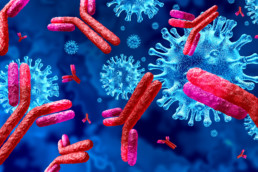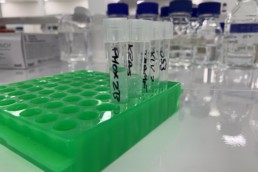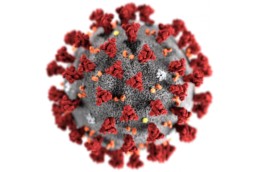Myrio Therapeutics awarded CUREator grant for pandemic preparedness research
31 May 2023, MELBOURNE, Australia – Australia’s sovereign pandemic preparedness has received a boost with Myrio Therapeutics Pty Ltd (Myrio), a privately-owned Australian biotechnology firm with a patented antibody screening platform, receiving $500,000 from Australia’s national biotech incubator, CUREator.
The grant, awarded by the federally funded Brandon BioCatalyst delivered incubator, will see Myrio work with researchers at the CSIRO, The Peter Doherty Institute for Infection and Immunity, Monash University, and James Cook University, to develop antibody-based products for the treatment of influenza in the event of a future pandemic.
Utilising Myrio’s patented Retained Display™ (ReD™) platform, the program will focus on the development of antibodies targeting a segment of influenza virus that has been conserved across all influenza pandemics since the 1918 Spanish Flu.
Myrio Chief Executive Officer Dr. Pete Smith said: “The ability to quickly deploy antibodies to fight emerging viruses will be key to Australia’s future pandemic preparedness. There is an unmet need in the Australian biotech sector for a company committed to the development of therapeutics that support this cause and we believe we can fill that gap.”
Myrio’s ReD™ platform accelerates the screening and isolation of highly specific antibodies that target conserved internal viral peptides presented through cell surface proteins (human Major Histocompatibility Complex (pMHC)).
Myrio’s approach to pMHC antibody development has the potential to be more reliable than traditional antibody therapies which target viral surfaces prone to evolution and reductions in efficacy. To date, Myrio’s platform has been used to identify antibodies against numerous pMHC targets, including paediatric oncology, neuroblastoma, ovarian cancer, melanoma, and prostate cancer. Once identified, antibodies undergo pre-clinical and clinical trials to validate their safety and efficacy.
“The program funded by the Brandon BioCatalyst CUREator is a positive step toward building Australia’s sovereign pandemic preparedness. It also represents a significant value inflection point for Myrio, equipping us with the proof-of-concept data we need to pursue a Series A capital raise and fuel our next phase of growth,” Dr. Smith added.
Australia’s GDP is estimated to have suffered a cumulative loss of $158 billion compared to its pre-pandemic trajectory, largely caused by lockdowns associated with L-strain and the Delta COVID-19 outbreaks, which occurred before the Australian population had full access to vaccines and other therapeutic interventions.
CSIRO research scientist in disease prevention and detection, Dr Daniel Layton, who is leading a portion of the Myrio CUREator program said: “Alongside vaccines, antibody therapies provide another tool to fight endemic viral diseases and have the potential to limit health and economic impacts of pandemics.”
“We look forward to testing the ReD™ antibody discovery platform in in vivo settings and helping build Myrio’s clinical data portfolio through this program,” Dr. Layton added.
The global market for monoclonal antibodies – focused largely on surface targets rather than pMHC targets which is Myrio’s point of difference – was valued at USD 210.06 billion in 2022 and is projected to exhibit a compound annual growth rate of 11.04% from 2023 to 2030.
“We are thrilled to receive the support and recognition from the prestigious Brandon BioCatalyst CUREator program, and hope these funds will help Myrio, alongside our collaborators at CSIRO, Doherty Institute, Monash, and JCU, position Australia as a global leader in pandemic preparedness research,” Dr. Smith concluded.
Myrio Therapeutics data published in Nature: unlocking new targets for antibody-based therapies
Myrio Therapeutics Pty Ltd (Myrio) today announced ground-breaking findings published in the Journal Nature. The study, titled Therapeutic Targeting of Intracellular Oncoproteins with Peptide-Centric CAR T Cells, used chimeric antigen receptor T cells (CAR-T), built using Myrio-discovered scFvs, targeting an intracellular protein in models of the childhood cancer neuroblastoma.
Key findings of the study include:
- Antibodies with the ability to selectively target peptides from an intracellular protein, PHOX2B, presented on the cell surface by major histocompatibility complex (MHC);
- Complete eradication of tumors in multiple patient derived xenograft models using CAR-T cells, despite neuroblastoma being a low MHC expressing solid tumor; and
- ‘Breaking restriction’: the ability of a CAR-T to target the same PHOX2B peptide presented by divergent MHC molecules.
Monoclonal antibody technology has been evolving for 45 years but the target landscape has not changed, being limited to cell-surface and soluble proteins. The ability of Myrio’s Retained Display™ (ReD™) antibody discovery platform to routinely target peptide-MHC complexes opens up a much broader range of therapeutic targets. The presentation of peptides on the cell surface by MHC enables T cells to detect and kill virally infected cells, or those harbouring mutations. Myrio has demonstrated that the target landscape for antibodies goes beyond that of T cells, being able to target non-immunogenic epitopes such as self proteins and most neoantigens.
One of the drawbacks of targeting peptide-MHC molecules is the diversity of MHC proteins within populations. This means that a peptide-MHC targeted treatment is ‘restricted’ to only those patients with a specific or closely related MHC.
Myrio Chief Executive Officer Dr. Pete Smith commented:
“The findings of this study represent a paradigm shift – for the first time, MHC restriction has been broken and we will be able to use a single product to treat a much broader patient population. This will improve our ability to recruit to clinical trials, especially in rare disease settings, and also treat patients of diverse ethnic backgrounds and genetics.”
The findings outlined in the Nature paper are the result of a collaboration between Professor John Maris’ laboratory at the Children’s Hospital of Philadelphia (CHOP) and Myrio (formerly Affinity Biosciences). The study combined CHOP’s leadership in cancer research and Myrio’s patented ReD™ antibody discovery platform, to identify and target key molecular drivers of neuroblastoma – the most common form of pediatric cancer outside of the central nervous system.
Neuroblastoma remains very challenging to treat, with half of children with high-risk neuroblastoma dying of the disease and many of the survivors suffering long-term complications from their treatments. The study used a newly identified target, PHOX2B, that is highly selective for neuroblastoma and is intimately involved in the biology of the disease.
Lead author Mark Yarmarkovich, PhD said: “Our work with Myrio has generated exquisitely selective antibodies with very potent anti-tumor activity using CAR and other immunotherapy formats. The peptide-centric nature of these antibodies allowed us to test and prove our hypothesis that tumor peptides could be recognized across different HLAs, breaking conventional HLA restriction, which will broaden the application of immunotherapy to more children with these deadly cancers.”
“Together with CHOP, we are planning to move the CAR-T program into the clinic around the end of next year and will use the same approach to target other paediatric cancers with high unmet medical need. We have also deployed the ReD™ platform against a range of other high value viral and oncology targets,” Dr. Pete Smith concluded.
For enquiries relating to the Nature paper or potential partnership opportunities get in touch with the team at Myrio here.
About the study
The Therapeutic Targeting of Intracellular Oncoproteins with Peptide-Centric CAR T Cells study was led by John M. Maris, MD, paediatric oncologist at Children’s Hospital of Philadelphia (CHOP) and lead author Mark Yarmakovich, PhD, senior scientist at CHOP. Ben Kiefel, Chief Operating Officer and other staff from Myrio are co-authors on the paper.
Professor Maris is a renowned authority on cancers of childhood with a particular focus on neuroblastoma, the most common cancer to occur in children outside of the central nervous system. The Maris lab identified multiple key molecular drivers of neuroblastoma including the transcription factor ‘paired homeobox-like 2B’ (PHOX2B) which is highly expressed in neuroblastoma and not in any normal tissues.
PHOX2B is an intracellular protein and, like all proteins made within a cell, short peptides derived from it are presented on the cell surface by major histocompatibility complex (MHC) for interrogation by T cells. The study found that Myrio’s ReD™ platform is uniquely able to find highly specific human antibodies that bind to peptide-MHC complexes and successfully generated antibodies that selectively target PHOX2B. The antibodies were used to direct T cells to target neuroblastoma using chimeric antigen receptors (CARs), achieving the aforementioned results.
CoVIC consortium publishes Global study on variant-resistant SARS-CoV-2 epitopes in Science

Myrio is proud to be part of the global CoVIC consortium, providing antibodies in the fight against COVID-19. The results of the consortiums work have this week been published in the prestigious journal Science, free access is available here.
CAR TCR Summit: Myrio Tx shares transformational approach to targeted human antibody-based therapies
Myrio Therapeutics (Myrio Tx) is driving a new frontier of antibody-based therapies as the company’s Retained DisplayTM (ReD) antibody platform offers identification of highly specific human antibodies that bind to peptide-MHC complexes.
Ahead of publication of key papers (including Nature in press) in the coming months, Dr Pete Smith, CEO, presents new insights at the prestigious CAR-TCR Summit this week.
“Monoclonal antibody technology has been evolving for 45 years but the target landscape has not changed. For the first time, our patented technology has not only shown unparalleled ability to isolate rare binders against challenging targets but to break MHC restrictions so that antibodies can be targeted based on their expression of almost any protein. This approach offers a potentially dramatic increase in targets and could transform antibody-based therapies for a myriad of diseases, in particular, cancer.”
The research offers a compelling opportunity for partnership as we look to move from the discovery stage. With input from industry, we can leave cancer with no place left to hide.” said Dr Smith.
The presentation at the CAR-TCR Summit will focus on the Myrio Tx’s:
- development and validation of the ReD platform to identify clinically-relevant pMHC targets;
- identification of antibodies which target novel intracellular targets (via pMHC) for solid tumor kill;
- early data for novel targets and demonstrating high potency and specificity in preclinical studies.
The utility of Myrio Tx’s ReD platform is vast and may be applicable for a wide range of diseases. The company is building a body of supporting data from quality collaborators including University of Pennsylvania (neoantigen CAR-T), CHOP (neuroblastoma CAR-T) and National Institutes of Health (HERV CAR-T).
Myrio Tx’s pipeline includes antibodies targeting melanoma, ovarian, prostate and cervical cancers.
The recording of the “Expanding the Target Universe for CAR-T and Accessing Novel, Intracellular Targets” presentation can be found by delegates during the Discovery Track at 5.15PM EDT / 2.15PM PDT on 31 August 2021.
For queries and interest in potential partnership opportunities, don’t hesitate to contact the Myrio Tx team directly.




